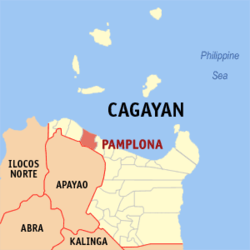Top Qs
Timeline
Chat
Perspective
Pamplona, Cagayan
Municipality in Cagayan, Philippines From Wikipedia, the free encyclopedia
Remove ads
Pamplona, officially the Municipality of Pamplona (Ibanag: Ili nat Pamplona; Ilocano: Ili ti Pamplona; Tagalog: Bayan ng Pamplona), is a municipality in the province of Cagayan, Philippines. According to the 2020 census, it has a population of 24,781 people.[5]
Remove ads
History
Summarize
Perspective
Pamplona is the result of the merging of two villages during the Spanish era - Abulacan (now barrio San Juan) and Masi. Abulacan was founded by the ecclesiastical authorities on April 30, 1757, with San Juan Nepomuceno as the patron saint. Sometime in 1842, Vicar Pedro Montenegro, O.P. convinced the people to unite the two towns. The vicar named it "Pamplona" in memory of his hometown Pamplona in Spain.
An agreement was also made that there would be two patron saints of Pamplona: San Juan Nepomuceno and San Pedro de Martir. This is the reason why the town fiesta is celebrated for two days and the images of the two patron saints are carried during religious processions. The town fiesta is celebrated every April 29.
In 1919, some of the prominent people of Pamplona recommended the transfer of the same to Bidduang, a barrio of Pamplona. The transfer was made on November 16, 1919, during the administration of municipal president Esteban Meneses by order of General Wood. In 1928, on the sixth year of the administration of municipal president Paulino Ifurung, one of his last acts was the transfer of the municipal government back to its old site, Pamplona, by then called "Albano."
Most interesting spot is the mouth of the Pamplona River. It saw history in the making for it was the starting point of Salcedo and his conquistadores when they explored Cagayan in 1572. Because of the river's strong current and unpredictable floods, Mayor Nicolas B. Aquino built in 1955 a concrete levee along Barangay Masi. He also built an irrigation system. It was the first of its kind in Cagayan.[citation needed]
In the late 1960s, Special Forces Regiment head Orlando Dulay allegedly ordered then-trainee Victor Corpus to assassinate mayor Anselmo Galano, but Corpus decided not to follow through with the order.[6]
On August 5, 2016, Vice Mayor Aaron Sampaga was assassinated in his friend's compound in Barangay Masi by motorcycle-riding gunmen. Sampaga had previously served three terms as mayor of Pamplona, during which his then-vice mayor Edwin Ifurung accused him of being involved in the 2014 murder of his brother, barangay councilor Edmund Ifurung.[7][8]
Remove ads
Geography
Pamplona is situated 140.67 kilometres (87.41 mi) from the provincial capital Tuguegarao, and 647.67 kilometres (402.44 mi) from the country's capital city of Manila.
Barangays
Pamplona is politically subdivided into 18 barangays. Each barangay consists of puroks while some have sitios.
- Abbangkeruan
- Allasitan
- Bagu
- Balingit
- Bidduang
- Cabaggan
- Capalalian
- Casitan
- Centro
- Curva
- Gattu
- Masi (formerly Zimigui-Ziuanan[9])
- Nagattatan
- Nagtupacan
- San Juan
- Santa Cruz (Pimpila)
- Tabba
- Tupanna
Climate
Remove ads
Demographics
In the 2020 census, the population of Pamplona, Cagayan, was 24,781 people,[16] with a density of 140 inhabitants per square kilometre or 360 inhabitants per square mile.
Economy
Poverty incidence of Pamplona
10
20
30
40
50
2000
41.65 2003
30.61 2006
19.70 2009
20.66 2012
26.71 2015
14.97 2018
16.40 2021
11.96 Source: Philippine Statistics Authority[17][18][19][20][21][22][23][24] |
Government
Local government
Pamplona is part of the second legislative district of the province of Cagayan. It is governed by a mayor, designated as its local chief executive, and by a municipal council as its legislative body in accordance with the Local Government Code. The mayor, vice mayor, and the municipal councilors are elected directly by the people through an election held every three years.
Elected officials
List of mayors
- Nicolas B. Aquino (1955 – 1963)
- Anselmo N. Galano (1963 – 1976)
- Antonio R. Ifurung (1992 – 1998)[26]
- Aaron Sampaga (2007 – 2016)
- Arnie Angelica Sampaga (2016 – 2019)
- Digna Puzon-Antonio (2019 – present)
Remove ads
Education
The Schools Division of Cagayan governs the town's public education system.[27] The division office is a field office of the DepEd in Cagayan Valley region.[28] The Pamplona Schools District Office governs the public and private elementary and high schools throughout the municipality.[29]
Primary and elementary schools
- Abbangkeruan Elementary School
- Allasitan Elementary School
- Bagu Elementary School
- Balingit Elementary School
- Bidduang Elementary School
- Cabaggan Elementary School
- Capalalian Elementary School
- Casitan Elementary School
- Curva Elementary School
- Masi Primary School
- Nagattatan Elementary School
- Pamplona Cenral School
- Pimpila Elementary School
- San Juan Elementary School
- Tabba Elementary School
- Tupanna Elementary School
Secondary schools
- Bidduang National High School
- David M. Puzon Memorial National High School
- Pamplona National School of Fisheries
- Pamplona Institute
Remove ads
References
External links
Wikiwand - on
Seamless Wikipedia browsing. On steroids.
Remove ads






